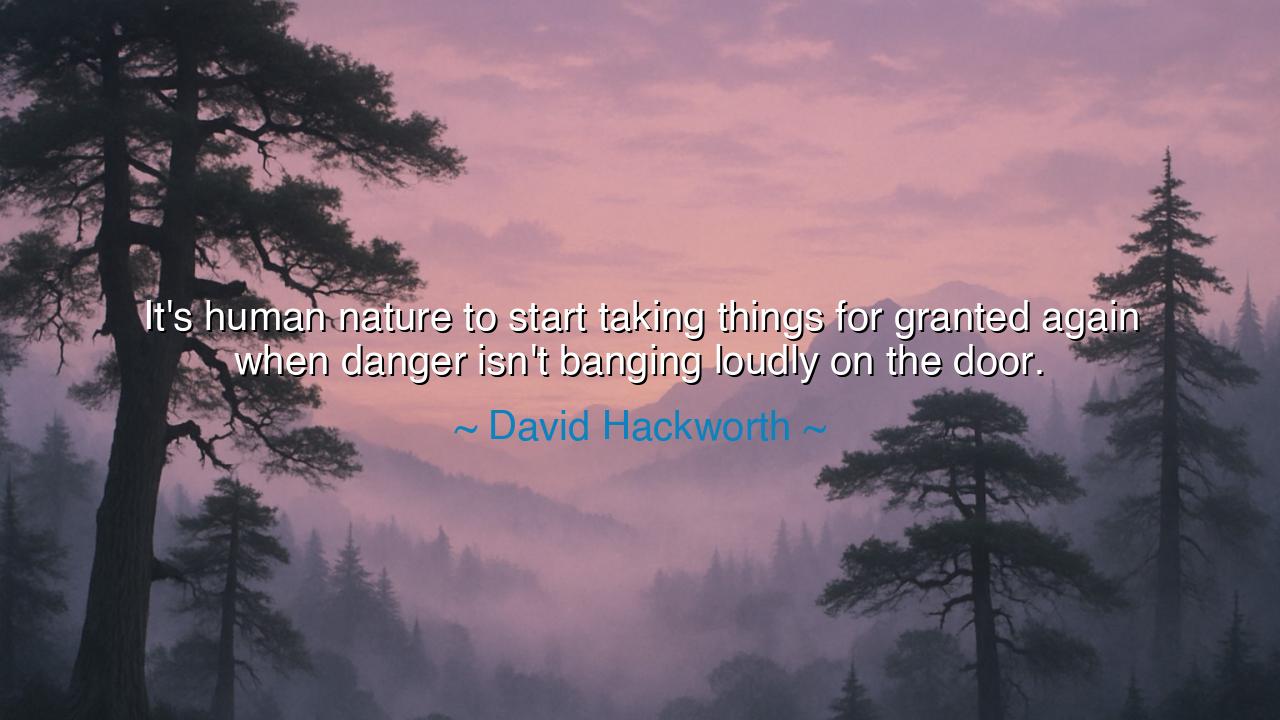
It's human nature to start taking things for granted again when
It's human nature to start taking things for granted again when danger isn't banging loudly on the door.






In the stern and sobering words of David Hackworth, soldier and truth-teller of war, we are given a mirror to our own forgetfulness: “It’s human nature to start taking things for granted again when danger isn’t banging loudly on the door.” These words pierce like a warning bell across the ages, for they reveal not only the weakness of men but the cycle of history itself. When fear is near, we rise vigilant; when fear departs, we sink into complacency. The heart of Hackworth’s teaching is simple: ease makes us careless, and in carelessness, peril is born anew.
To call it human nature is to admit that this pattern is woven into the fabric of our being. The shepherd watches closely when the wolf prowls at the edge of the flock, but when the fields seem safe, his watch grows lax, and the wolf returns. The city strengthens its walls when the enemy gathers, yet in years of peace the walls crumble with neglect, and the city falls at the first strike. So too in the soul: when hardship presses, we cling to discipline and prayer; when the hardship passes, we wander, forgetting the lessons learned. Hackworth, who knew war’s face, saw this cycle in the hearts of nations and men alike.
History offers countless examples. After the fall of the Twin Towers in New York, a nation stood united, vigilant against threats. But as years passed and the sounds of destruction grew faint, divisions reappeared, and many forgot the urgency of vigilance. In ancient times, the Athenians too, after the Persian wars, grew complacent in their prosperity, forgetting the hardship that had once sharpened their resolve, and in that forgetfulness, they sowed the seeds of decline. It is a rhythm as old as mankind: danger awakens, peace lulls to sleep.
Hackworth himself, forged in the fires of Korea and Vietnam, understood the cost of forgetting. Soldiers in the field, when danger is near, polish their weapons, scan the horizon, and sharpen their instincts. Yet when the guns fall silent, the same soldiers grow careless, and readiness fades. He saw with bitterness how nations forget their veterans, how societies forget the lessons of war once peace returns. His words are not complaint, but a call to memory—that we must remain vigilant even when the door is silent, for danger never sleeps entirely.
The meaning of his teaching is not that fear must rule us, but that gratitude and vigilance must accompany peace. When danger recedes, it is easy to take for granted the safety bought by sacrifice. We forget the price paid by those who stood watch in our place. We forget the fragility of comfort and the swiftness with which fortune can change. The human tendency is to drift, but Hackworth’s words urge us to anchor ourselves in remembrance, lest the tides of complacency sweep us into ruin.
The lesson is clear: live with awareness, even in times of ease. Do not wait for the enemy at the gate to remember the strength within. In times of peace, cultivate discipline; in times of prosperity, practice gratitude; in times of silence, remember the sacrifices that brought the calm. For wisdom lies not in responding only when danger knocks, but in preparing when the world seems quiet.
In practice, this means building habits of vigilance and gratitude. Keep your skills sharp even when they are not demanded. Honor those who sacrificed for the freedoms you enjoy. Teach the next generation the price of peace, so they do not grow blind to its fragility. And above all, resist the lure of complacency, for though danger may not always bang upon the door, it lingers in the shadows, waiting for forgetfulness to open the way.
Thus, Hackworth’s words stand as both warning and wisdom: “It’s human nature to take things for granted when danger isn’t banging loudly on the door.” Let us hear them as the voice of experience, carved from hardship and vigilance. And let us live so that when danger comes again—and it will—we are not found asleep, but awake, grateful, and ready.






AAdministratorAdministrator
Welcome, honored guests. Please leave a comment, we will respond soon